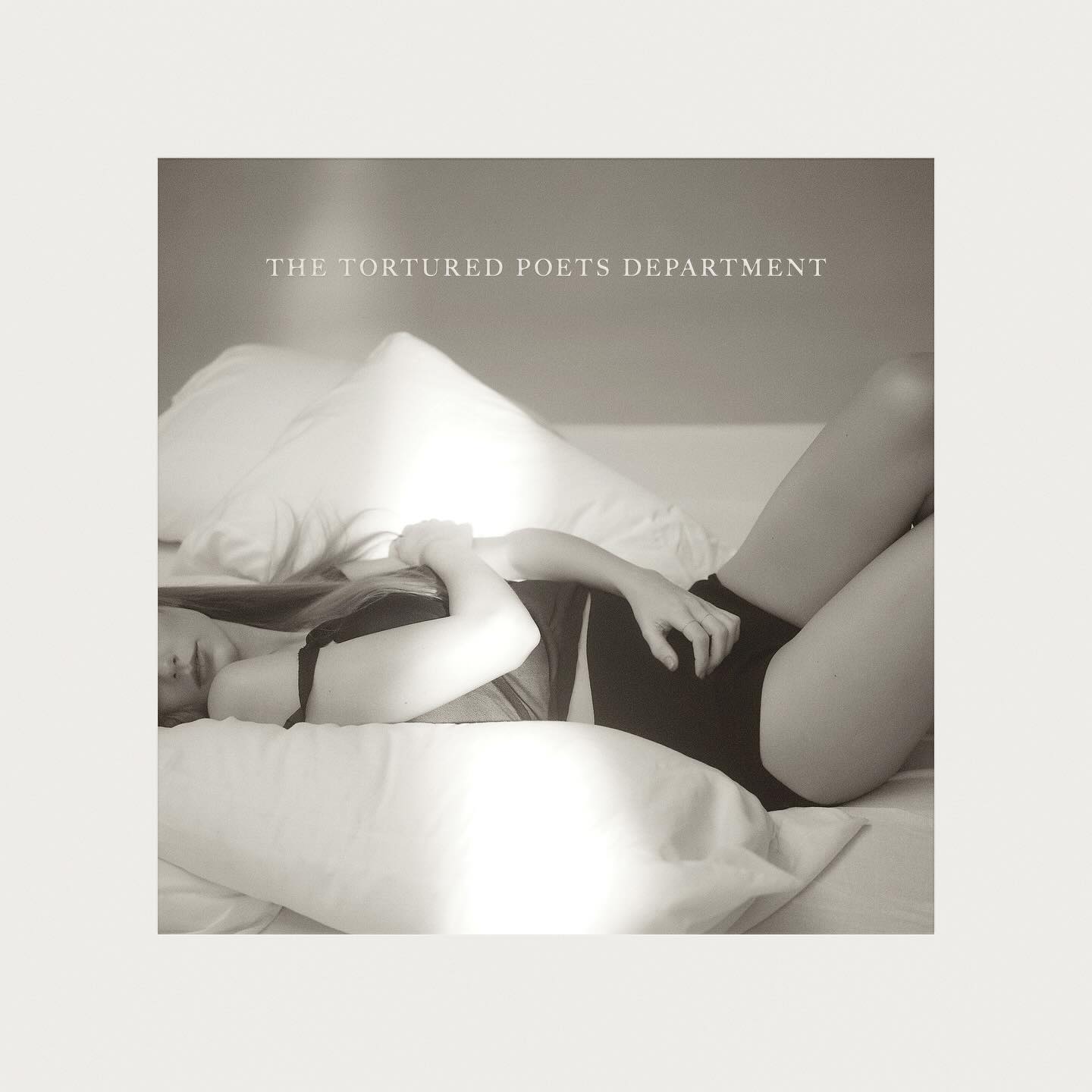
On April 19, Taylor Swift unleashed a definitive break-up album in the form of her eleventh studio record, The Tortured Poets Department. Like her previous narrative-driven works, Swift threads a tale of heartbreak and introspection, with the songstress casting herself as ‘The Chairman’ of the titular fictional bureau.
As expected, the album is littered with cryptic lyrics and conspicuous references that fuel conspiracy theories and signal Swift’s inspiration for penning the tracks. From the outset, all clues point to the record being a cathartic retrospective of her relationship with Joe Alwyn. With songs like “So Long, London” reframing her love for the English actor professed in Lover’s “London Boy”, The Tortured Poets Department is slated to be Swift’s most emotionally charged album yet. Yes, mining relationships for musical content isn’t a new manoeuvre by any means, but on TTPD, it’s apparent Swift is unflinchingly reclaiming this mode. As she said when announcing the album at the 2024 Grammys, “All’s fair in love and poetry”.
To help cut through the noise, we’ve compiled a comprehensive breakdown of the album, including every Easter Egg of note and lyric worth scrutinising. Ahead, is a complete analysis and guide to understanding Taylor Swift’s album, The Tortured Poets Department.
All The Easter Eggs In The Tortured Poets Department.
1. The Album Title: The Tortured Poets Department
Swift’s acolytes believe the album title itself is a reference to Joe Alywn. But let’s take a step back, shall we?
In 2022, while accepting a songwriting award at a Nashville event, Swift shared the songwriting tool she employs to help craft her lyrics. This trope wasn’t previously known to her fans, but it entails Swift mentally categorising her lyrics into three different groups. “They are affectionately titled Quill Lyrics, Fountain Pen Lyrics and Glitter Gel Pen Lyrics,” she said. “I came up with these categories based on what writing tool I imagine having in my hand when I scribbled it down, figuratively,” she added. Swift confirmed TTPD doesn’t feature any “Glitter Gel Pen” lyrics, which she describes as “frivolous, carefree, bouncy, syncopated perfectly to the beat” and like “the drunk girl at the party who tells you that you look like an Angel in the bathroom”.
The first two styles of lyrics heavily reference poets, which could partially be the inspiration for the album name. “‘Quill’ style if the words and phrasings are antiquated if I was inspired to write it after reading Charlotte Brontë or after watching a movie where everyone is wearing poet shirts and corsets,” she said. “‘Fountain pen’ style means a modern storyline or references, with a poetic twist. The songs I categorise in this style sound like confessions scribbled and sealed in an envelope, but too brutally honest to ever send.”
In TTPD, Swift paints herself as a modern poet and finally delivers the heartless truth, literally dubbing herself ‘The Chairman’ of this group of tormented writers. So, what does Alwyn have to do with it? As Swifties uncovered, Alwyn admitted that he and Paul Mescal, who both achieved mainstream success for their portrayal of Sally Rooney characters, share a group chat called the “Tortured Man Club”. The theory that Swift overtly referenced Alwyn in the title led someone from his camp to issue a statement to the press explaining his stance on the release.
According to a source, Alwyn feels “it would be ‘shady’ for her to ‘diss’ him in any way given that he’s remained so stoically silent about their split”. “She writes about her past using code and points of reference. It may just be that she is reflecting on their time together and he is hoping it is nothing more,” they added.

2. The Tortured Poets Department Release Date
Swift is a believer in numerology. She waxed lyrical about her love of the number ‘13’ and the numbers ‘89’ and ‘87’ even serve as an “invisible string” tying her to Kansas City Chiefs tight end, Travis Kelce. Swifties believe April 19, the day of TTPD’s release, holds significance as that was the day Swift, Blake Lively and Ryan Reynold all went out to dinner and immediately unfollowed Alwyn on Instagram. As we know, Swift doesn’t deal with coincidences, so her decision to release the album a year to the day after this canon event in Swift-ory is telling.
3. The Tortured Poets Department’s Black and White Colour Palette
Swift associates a colour to every album she releases to help paint the world she’s creating through her songs. TTPD’s scheme is black and white, which she embodied with the custom Schiaparelli gown she wore to the 66th Grammys. Black was also used for her revenge-inspired Reputation album, causing fans to believe they are sister albums. Reputation was written during the early stages of Swift’s relationship with Alwyn, and with The Tortured Poet Department documenting the end of their love story, this circular notion could be correct.
It’s also worth noting that Swift used the re-recording of Reputation as a red herring to misguide fans before surprising them with TTPD. Swifties believed that Reputation would be the next album to undergo the re-recording treatment as the announcement for TTPD’s coincided with the sixth anniversary of Reputation. Six Years is also called out in the Midnights’ track “Glitch” where Swift sings, “It’s been two thousand one hundred and 90 days of our love blackout”. As Swift mentions a breakup, the specific focus on this period could also be interpreted as referencing the six years she and Alywn dated.

4. “Clara Bow” from The Tortured Poets Department
Along the lines of numerology, Swift lists her tracks in a very specific order. As fans are aware, Swift puts “a very vulnerable, personal, honest, emotional song” as the fifth track. (TTPD’s is “So Long, London” if you were curious.) However, there is a lot of subtext to be deciphered in the final, sixteenth track, “Clara Bow”. Bow is a famous actress from the 1920s and the original ‘It’ girl. Her performance in the film It was the impetus for this phrase to be coined and bestowed onto a society woman with a noteworthy quality.
The easiest read of the song title choice is that Swift feels a kindred spirit in Bow. But fans have discovered a lot of references to the actress in Swift’s entire body of work. Firstly, Bow’s star on the Hollywood Walk of Fame is located on the corner of Sunset Boulevard and Vine Street—a location she names on the Reputation single “Gorgeous”. (“Whisky on ice, Sunset and Vine / You’ve ruined my life, by not being mine”). Fans have also uncovered a poem (!) called “When Battling Bill of the Bowery Fell for Clara Bow”. As we know, William Bowery was the pseudonym Joe Alwyn wrote under when collaborating with Swift on songs for Swift’s Folklore and Evermore albums. (Interestingly, Alwyn also has a writing credit on “Gorgeous”). Bow also visits Coney Island in It. Swift titled her ninth song from Evermore “Coney Island”. Clearly, Bow is Swift’s muse. Now, she’s been immortalised in her song canon.
5. “The Albatross” from The Tortured Department
Swift announced the bonus track “The Albatross” during her first night of the Eras Tour in Sydney. Continuing the six-year motif, fans have deduced the song title is in reference to the six years the bird spends flying uninterruptedly at sea. Is Swift bracing herself to land? Maybe.

6. “The Black Dog” from The Tortured Poets Department
Swift’s 17th song is a track titled “The Black Dog”. The name isn’t a metaphorical reference to the ‘Black Dog’ littered throughout folklore, but rather a pub in South London. In the single, she laments how her ex-lover casually frequents the pub they used to visit with his new girlfriend, much to her confusion as he doesn’t care about the memories they shared there. She also calls out the 2000s emo band, The Starting Line, whom Healy has previously covered during sets with his Manchester-founded band, The 1975.
Chatter around the song even prompted the pub itself to weigh in on the conversation. In a TikTok, the venue joked how they were trawling through their CCTV to the last time The Starting Line played to gauge if Healy or Alwyn were in attendance. More to come on this.
Swift seemingly spends most of TTPD discussing her fling with Healy rather than her six-year relationship with Alwyn, as expected. In “Fresh Out The Slammer”, Swift hints at how their short-lived tryst stemmed from Healy being her “first call” after she got out of the long-term romance.
“I Can Fix Him (No Really I Can)” is also a subtle nod to how The 1975 styles their song titles, referencing the parentheses that feature across their body of work.
Did Swift use TTPD to confess to having a secret 10-year situationship with Healy? Perhaps. But as she shared when announcing the album, “this period of the author’s life is now over, the chapter closed and boarded up.”

7. “thanK you aIMee” from The Tortured Poets Department
On “thanK you aIMee”, Swift seemingly gives herself space to close another chapter of her life: her feud with Kim Kardashian. The conflict between the SKIMS founder and her ex-husband Kanye West has always been the thorn in Swift’s side. While this began back in 2009 when West stole Swift’s microphone to denounce her VMA win, it reached fever pitch when Kardashian leaked a private phone call seemingly proving Swift not only was aware of but approved West’s lyric calling her a “b****” in The Life of Pablo track “Famous”.
The backlash prompted Swift to take herself into hiding. She relocated to London and reportedly didn’t leave the house for a year. Yet, after meeting and falling in love with Alwyn, she began to chart her return to the zeitgeist, cultivating with the release of her scornful album, Reputation. On TTPD, Swift paints a different point of view—one of respect and gratitude for Kardashian. Swift sings that despite ‘Aimee’ being a bully, she’ll never forget the lessons she took from the fight.
“I wrote a thousand songs that you find uncool / I built a legacy that you can’t undo /But when I count the scars, there’s a moment of truth /That there wouldn’t be this if there hadn’t been you,” Swift sings in the bridge.
Swift previously spoke out about the impact of the feud in her 2023 ‘Person of the Year’ cover with TIME Magazine. “Make no mistake—my career was taken away from me,” Swift said. “You have a fully manufactured frame job, in an illegally recorded phone call, which Kim Kardashian edited and then put out to say to everyone that I was a liar,” she added.
“That took me down psychologically to a place I’ve never been before. I moved to a foreign country. I didn’t leave a rental house for a year. I was afraid to get on phone calls. I pushed away most people in my life because I didn’t trust anyone anymore. I went down really, really hard.”
This story originally appeared on GRAZIA International.
